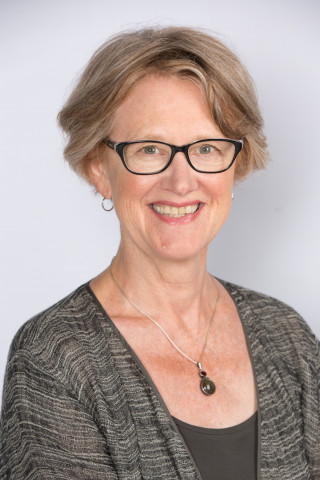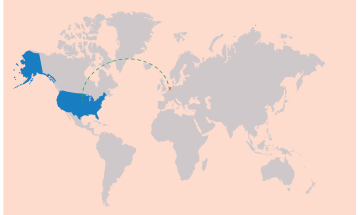How do they do it in the United States?
In the United States, EDUCAUSE has set up a roadmap for digital transformation in higher education. Betsy Reinitz, Director, Enterprise IT Program, tells us about the vision behind the roadmap. Can we learn something from the Americans?
It’s not about IT: the transformation that EDUCAUSE proposes is much more comprehensive than that, explains Reinitz. Technology is just one of the factors, though it is vital. 'About four years ago, we were looking at other industries, outside of higher education. Some companies, like Amazon and Uber, were really transforming their industries through their digital efforts. It looked like something we should be paying attention to. So we started to wonder what a digitally transformed higher education might be like.' In the US, competitiveness is just as important in higher education as it is in retail or transport, explains Reinitz. 'There’s a finite number of students. Studying at a college or university can be very expensive in America. You can use digital transformation – Dx, as we call it – to really focus on the question: why would a student come to your institution? It’s like the value proposition of a business.'

Betsy Reinitz
EDUCAUSE put together a taskforce, which drew up a report. It defines Dx as 'the process of optimizing and transforming the institution’s operations, strategic direction and value proposition through deep and coordinated shifts in culture, workforce and technology.'
Reinitz: ‘The really important bit is that emphasis on institutional change. A lot of people hear the word digital and they think: oh, you’re putting your courses online and therefore you have digitally transformed your college or university. It’s not like that. You need shifts in all those three aspects.’
Trust in Data
For many colleges and universities, technology is the most straightforward shift. ‘To enable rapid changes, you need a very flexible IT infrastructure. Just look at our current pandemic situation. Dx can really help you prepare for whatever the future brings.’ The shift in culture has lots of aspects. ‘Culture can be very ingrained. That is very true in American higher education. Decisions are often based on tradition: how we’ve always done it. I think changing that can be a really hard part of Dx. It takes leadership: having a leader who can envision the future and then help others see it too.’
Data are another cultural issue, according to Reinitz. ‘Dx is about making decisions that move your institution closer to its goals. You need data to inform those decisions and understand what kind of impact your decisions have had on your progress. We talk about it as a culture of trust in data. Being able to really believe that your data are good.’ That brings us to the third shift: in workforce. ‘In order to do Dx well, institutions will have to make sure that data literacy is adequate across the organisation.’

Roadmap
To get institutions started, EDUCAUSE put together a Dx Journey Roadmap. Reinitz explains that there are three phases to that journey: learning about Dx, planning your changes and then actually executing them. The roadmap includes a self-assessment tool. Reinitz: ‘You rate your institution’s readiness for Dx in the capability areas we feel are important. After you finish the tool, we send you back a report that includes recommendations for how you can advance those capabilities. So if you score low in the area of strategic initiatives, it will give you a set of examples for what to do. As well as some suggestions for further reading.’ Another tool provides a guide to designing a Dx strategy. ‘It’s a six step process, starting with the question of why you are doing this. With those two tools, people really get a handle on where to start.’
*The tools are only available to EDUCAUSE members as part of their membership model.
Tools voor digitalisering in het hoger onderwijs
Op de website van het Versnellingsplan en bij de Vraagbaak Online Onderwijs vind je meerdere tools om direct aan de slag te gaan met digitalisering in het hoger onderwijs.
Breakthrough
So how’s Dx doing in the USA? ‘The pandemic was a wakeup call. It made colleges and universities realise that they need flexibility to survive and thrive. And a lot of the competencies that higher education had to rely on during the pandemic are the very things that are necessary for Dx.’ Another bonus of the pandemic was the breakthrough for working from home. Reinitz: ‘Part of Dx is an emphasis on a better work/life balance. That’s a big issue in the US: being able to have a real life outside of your career. I think the progress that was made is here to stay.’ Two successive EDUCAUSE surveys (survey 1 and survey 2) did show that many more institutions are engaging in digital transformation now. In 2019, just before the pandemic, 13 percent said they were. In the fall of 2021, that number had more than tripled, to 44 percent.
I think success means transforming your institution in a way that will let it deal with big challenges. Dx can really help institutions as they go forward into whatever strange future we’ll have.
Cultural Barriers
Obviously, 44 is still less than 100. ‘We also asked institutions about obstacles to Dx,’ says Reinitz. ‘What we found is that the biggest barriers are cultural: resistance to change, risk aversion, lack of trust in data. But on the whole, there was a lot of progress in lowering barriers. With one exception: cross-institutional coordination, pulling people together across organisations. There we still had 52 percent saying it was an obstacle to Dx.’
Looking forward, when will Reinitz consider digital transformation to be a success? ‘That is a really good question. We talk about Dx as an approach, more than a destination. It’s not something you’ll ever finish, or something you check off on your to do list and say, OK, we did that. But I think success means transforming your organisation in a way that will let it deal with big challenges. Dx can really help institutions as they go forward into whatever challenging future we’ll have.’
Text: Aad van de Wijngaart
Translation: Deepl
EDUCAUSE
Advancing higher education through the use of IT is the mission of EDUCAUSE, a nonprofit association in the USA. The membership of EDUCAUSE comprises the largest community of technology, academic, industry, and campus leaders sharing that mission. EDUCAUSE provides its members with knowledge, resources, and community-building opportunities needed to help shape strategic IT decisions at every level in higher education.
SURF is also a member of EDUCAUSE and for decades, many people from SURF member institutions have been attending the annual EDUCAUSE conference.
'How do they do it in the United States' is an article from SURF Magazine. Monthly the newest articles in your inbox? Then subscribe to the SURF Magazine newsletter (in Dutch).
Questions about this article? Mail to magazine@surf.nl.
